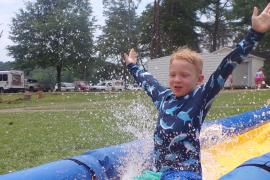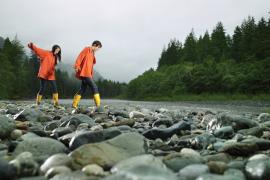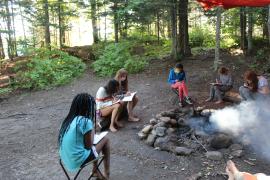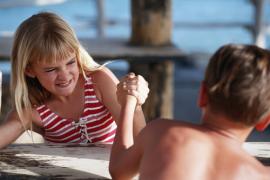Close your eyes and think of a scene at camp. There is probably some mix of singing, laughing, and playing where the adults are wearing costumes (seemingly related to nothing), the campers are engaged, and “camp” is happening. Take a quick survey of the adults in this scene. What are they doing?
Chances are what you noticed, even in your mind’s eye, was the extroverted and gregarious behaviors of the staff. Screaming announcements (not mad screaming, just really loud talking), facilitating large group games, dancing their way to the next activity, and so much more. These are definitely hallmarks of great camp counselors. Unfortunately, sometimes we see these kinds of behaviors as the only hallmarks of great camp counselors.
But look a little more closely at the scene in your head. Where are the other staff members when the program director gives the daily program announcements in a loud British accent? What is her co-counselor doing when she engages the entire group in the “keep it off the ground” beach ball game on their walk to the waterfront? What are the counselors doing right at the edge of the exciting center of attention?
Last summer I tried to pay attention to what was happening everywhere else to support these kinds of moments at camp. What I noticed astounded me. When I took the time to stop and notice what was happening, I saw important and powerful counseling skills that not only supported, and frankly, facilitated, the smooth operation and flow of camp, but actually attracted campers’ attention and brought balance to most of these moments, activities, and situations.
For years (arguably forever) we have taught you how to be an outgoing counselor, and all the skills that go into being loud, the center of attention, the facilitator, and to some degree, being over the top with a larger-than-life personality. While those skills and ideas are still important, they are not the only skills that make a great camp counselor or the only skills that effectively deliver the summer camp experience.
Anyone who has worked with kids knows they need balance. They need active and fast-paced activities just like they need slower, quieter, and more reflective activities. The same is true for what they need from the adults around them.
“You can’t listen you won’t hear me
With your head stuck in the sand”~ The Quiet One by John Entwistle (The Who)
It all starts with simple observing and building awareness. But as many of you know, things that are simple aren’t always easy. For our purposes, observing is a bit passive. It’s just seeing and noticing what is going on around us. Awareness is when we add up those collective observations into something we think about, feel, or act on.
Observing isn’t as objective as you may think. Real observation has a lot to do with what you already bring to the moment. Think about how “fake news” or the idea of “alternative facts” is being used in our society. We can all witness the same thing, yet what I notice and understand is often very different than what someone else describes.
Our experiences, emotions, and frame of mind often act as a filter for how we understand what we observed. The very best counselors don’t necessarily deny that from happening; they just separate the observation from what they can or should do about it, how they think about it, and what to feel about it.
Here’s what I mean. You just saw two campers being exclusive and telling a third camper he or she can’t play with them. Your first instinct as a caring camp counselor is to take care of the camper who got left out, discuss inclusivity and respect, and encourage (maybe strongly) that we include everyone when we are playing games. Great! Those seem like appropriate next steps, however that’s about what is next, not just observing. We live in a society that rushes to judgment and is always at the ready with “alternative facts,” so it’s no wonder we jump to conclusions and make a lot of assumptions.
Observing
Here are the best ways to practice just observing:
Three unique things. At any random moment, at camp or not, stop what you are doing, look around, and ask yourself, “What are three unique things happening right now?” Since your brain is already primed to see “difference,” you are using that process to become a more observant camp counselor.
Where are you facing? Great observation skills start with a very simple idea. You can’t observe it unless you are looking at it or listening to it. So, face the right direction. Physically put yourself in a space where you can see the campers, activities, or whatever else is going on.
Emojis. We all use emojis a lot these days. Why? There is somehow more expression and meaning in a little, red, mad face than there is in a text that says, “I’m mad.” Use that idea at camp this summer. Campers have “emoji moments” all the time. Their face or other body language indicates some feeling or another, but you have to work to observe and notice them or they will fly under the radar.
Becoming aware of something feels more like movement or the growth of an idea. There is action implicit in the idea of awareness. So, if observation is collecting scenes and experiences that we witness, awareness is putting them together into an understanding about what might be going on.
Using the same example from before, if we noticed those same two campers sitting together at every meal, signing up for the same activities, and hanging out together during free time, we would become aware pretty quickly that they are probably best friends. That doesn’t mean it’s okay for them to be exclusive; it just means we are more cognizant of where the exclusivity might come from.
When we are aware of what is going on around us, we are better prepared to use all our great counseling skills to enhance a positive experience and redirect a negative one.
Once we are comfortable actively observing what is going on around us and used to synthesizing those observations into awareness, there are several skills we can learn from our quieter staff that have a huge impact on the camper experience.
“You can see but you can’t hear me”
~ The Quiet One by John Entwistle (The Who)
Silence
One of the most powerful moments I witnessed last summer could have been a scene from a silent movie. No one actually said anything. A camper who was obviously feeling upset had a pretty disruptive outburst and ran away from the group crying. One of our counselors waited and watched. She noticed that the camper wasn’t really running away, just getting space from the group. She watched him until he stopped, gave it half a minute or so, then slowly walked over to him. Once there, she sat down and started to pick at the dirt, sticks, and grass in front of her. She didn’t ask him anything. She didn’t say anything about herself. She sat in silence, just being physically present with the camper. After a few minutes he stopped crying. He said something I couldn’t hear, then they both walked back to the group smiling. Later, I asked the counselor what the camper had said to her, and she said, “Thank you.”
Sometimes, campers need us to just be there. Their feelings and experiences are complicated, and filling the air with questions like, “What’s wrong?” or “Do you want to talk about it?” can increase anxiety and negative feelings because they are hard to answer.
My nine-year-old daughter had a very over-the-top reaction to something a few months ago. When I went to talk to her about it, she said, “I’m sensitive and I’m just feeling my feelings!” but she couldn’t really explain it much further. She didn’t need to, and she didn’t need me to say anything to her; she just needed me to sit on the end of her bed while she cried, then breathed, then started to feel better.
Start practicing the skill of silence. This will be way easier for some of you than others but, like any other skill, it just takes practice to get better.
Be Physically Present
Sounds easy, right? Try it without necessarily talking or taking over the game or activity. It can be quite difficult to just be. When you practice being physically present and are less concerned with what you are going to say, you’ll notice a lot more. Think about proximity, or where you are in relation to the camper or campers. Think about your posture and what the campers (or adults) around you might think about how you are feeling or your level of interest. Think about the direction you’re pointed, both where you are looking and where your shoulders are pointed or squared off to. This is a big indication about what you are paying attention to and concerned with. Finally, think about your face. What is it saying?
Waiting
I am talking about using waiting to help campers develop ideas and feel like they have the space to say more. Often, adults use waiting as a quasi-punishment or admonishment for talking or disrupting. That isn’t what we are talking about here. In fact, I’m not convinced that does much. It’s pretty unclear from the camper point of view, unless you are explicit about why you are waiting. You can practice this by simply counting to ten in your head after someone says something. Try it. It’ll probably feel super awkward the first few times you do it. If it helps with the awkward feeling, add a head nod and a few “ums” or “uhs.”
When you start to practice using silence as a way to engage campers, you’ll notice right away how uncomfortable silent space can be. Most people want to fill the silent space, even if there isn’t something specific to talk about. Let the campers fill it. Of course, I want you to be responsive to them, but notice how the silence helps them develop their thoughts and ideas. As a side note, not everyone processes words, sounds, and the like, at the same rate or with the same depth of understanding. When you create silent spaces, even if for only a few seconds, it allows more campers to get the level of comprehension that you want.
“I ain’t quiet — everybody else is too loud”
~ The Quiet One by John Entwistle (The Who)
Whispering
Whispering is an amazing counseling technique. Depending on when, where, and how you whisper, you can actively engage campers, communicate very clear ideas, and even help campers feel special and a part of something bigger. Here are three ways to practice whispering as a camp counselor
Whispering as an attention getter. As adults at camp, we typically have all kinds of creative ways to get campers’ attention. From counting off to clapping once, to call and response, there are tons of ways to get everyone’s attention without yelling. Try whispering. Lean in, get down on their level, make an excited face, insert a few-second pause, and then whisper whatever it was you were just about to say to everyone. It’ll be so different and unique, you’ll have captured most campers’ attention almost immediately.
Whisper activity instructions or directions. When giving instructions for any activity, we often break things down into memorable and accomplishable small steps. It’s just easier to do a project or game if each step is clear. Next time you are giving a series of instructions or directions, try to whisper some of them. The group will automatically quiet down and lean in to hear. They will start to talk with each other about what you said to do, and they will laugh and have more fun because it is kind of silly. And wouldn’t it be great if all our campers did more of that?
Whisper when you are having one-on-one conversations. I have used this technique in a few different ways. The first is during more difficult conversations, when a camper has made some bad choices. Whispering in this context helps campers with the embarrassment they are feeling because of what they did. The subtext of the whisper here is that this conversation is private and we aren’t going to tell everyone about their bad behavior. The other times I have used whispering to tell a camper something I’ve gotten the feeling that it makes what I’m saying special somehow. Sort of like a secret. We whisper secrets because they are special and only for the person or people we are telling. I’m not saying have secrets with campers; that could feel exclusive and look like favoritism. I’m saying that when you whisper, the camper with you often feels important and special.
“I ain’t never had the gift of the gab”
~ The Quiet One by John Entwistle (The Who)
Writing
Try this quickly. Take out a piece of scrap paper and write down a secret you have that you have never told anyone. A big secret. After you write it down, fold up the piece of paper and hold it in your hand. How does that feel? When I have done this activity with people they have reported a variety of feelings from uncomfortable and nervous to liberated and excited. It’s an interesting exercise because just the act of writing it down can feel like you are changing the nature of the secret; it seems to give it more power, and it can elicit pretty big feelings. Writing it down somehow makes it more real. Just a minute ago you had the same secret locked away in your brain; all you did was write it down.
That is just one example of the magic of writing things down. As a camp counselor, the power of writing can help with learning, feeling comfortable, and creating a sense of accomplishment.
Writing helps with learning. The very best teachers do a lot of writing while they are teaching. Sometimes they write specific ideas, trigger words to highlight concepts, or even related visuals or words but not the exact idea. Those techniques engage the visual part of your brain and processing. It’s not just about being a visual learner or thinker, it’s about putting it in your brain in several ways. When you are working with campers this summer, carry a notebook or small white board in your backpack. When discussing rules, steps for a project, directions for an activity, or just about anything else, write some key ideas down and show them at the same time you are telling them. Comprehension goes through the roof when we see it and hear it!
Writing can be calming. When things like rules, instructions, and steps are written down and available for everyone to see, it can decrease anxiety about that activity. If there are more than one or two steps, rules, or whatever, then you are providing an easy way to stay on track, follow the rules, or accomplish the task, because everyone can check what is next. Try it. Write your cabin or group rules, the daily schedule, the steps for a project, or something else at your camp. Watch how often campers (and other staff members) check it or reference it when you are in that space. It doesn’t change, but we all will look at it over and over because it is grounding and affirms what we thought.
Writing helps us feel accomplished. For those of you who are list makers, think about what your favorite part of making a list is. Nine times out of ten, list makers report that scratching stuff off the list is the best part. In fact, most of you have probably added things to your list that were already done just to be able to cross it off. As a camp counselor, you can use that same white board or daily schedule to help campers have that feeling of accomplishment. Carry a red marker with you and, throughout the day, have them cross things off of your schedule or the list of things on your whiteboard as they are completed. Watch their faces when they do this. They will beam!
The Yin and Yang
The final thing that really stands out to me when I observe quieter staff is that they are the “yin” to the rest of camp’s “yang,” meaning they complement and support everything that is going on. They often sit with the campers when everyone is getting directions, they actively participate alongside of campers in the activities, and they role model how to listen and engage in the whole flow of camp. In fact, I think much of our programming would fail miserably without most of the staff being quiet enough to follow the lead of others.
Being a great camp counselor is not a one-size-fits-all category. There are so many great skills and ideas right in front of us, if we are willing to see them. It’s time to practice a variety of skills. So, go greet your campers and loudly and proudly quiet down!
Photo courtesy of Louisiana Lions Camp, Anacoco, Louisiana.
Reference
Entwistle, J. (1981). The quiet one. The WHO. Retrieved from https://youtube.com/watch?v=kJDlbgwzxhU
Scott Arizala is a leading expert, trainer, and consultant in summer camp. He is the CEO of The Camp Counselor, a consulting and training company, and the executive director of Chasing Summer, an organization dedicated to creating access for people with autism in recreation and education. He is a pioneering contributor to and project manager of Expert Online Training, a world leader in online training for camp staff. Scott is the author of the best-selling book, S’more Than Camp and contributing editor of Happiness, Diversity & Autism: Practical Strategies for Inclusion.




